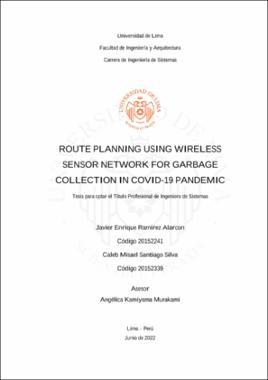Route planning using wireless sensor network for garbage collection in COVID-19 pandemic

Ver/
Tesis
(application/pdf: 800.0Kb)
(application/pdf: 800.0Kb)
Fecha
2022Asesor(es)
Metadatos
Mostrar el registro completo del ítemResumen
Garbage collection is a responsibility faced by all cities and, if not properly carried out, can generate greater costs or sanitary problems. Considering the sanitary situation due to the COVID-19 pandemic, it is necessary to take sanitary safety measures to prevent its spread. The challenge of the present work is to provide an efficient and effective solution that guarantees a garbage collection that optimizes the use of
resources and prioritizes the attention to garbage containers located in or near contagion risk zones. To this end, this research proposes the integration of a basic garbage monitoring system, consisting of a wireless sensor network, and a route planning system that implements the decomposition of the Vehicle Routing problem into the subproblems of clustering and sequencing of containers using the K-Means and Ant Colony algorithms. For the monitoring of garbage, a significant reduction in the measurement error of waste level in the containers was achieved compared to other authors. About route planning, adequate error ranges were obtained in the calculation of the optimal values of distance traveled and travel time indicators with respect to an exhaustive enumeration of routes.
Cómo citar
Ramirez Alarcon, J. E. y Santiago Silva, C. M. (2022). Route planning using wireless sensor network for garbage collection in COVID-19 pandemic [Tesis para optar el Título Profesional de Ingeniero de Sistemas, Universidad de Lima]. Repositorio institucional de la Universidad de Lima. https://hdl.handle.net/20.500.12724/16461Editor
Universidad de LimaTemas
Coleccion(es)
- Tesis [73]
El ítem tiene asociados los siguientes ficheros de licencia:

